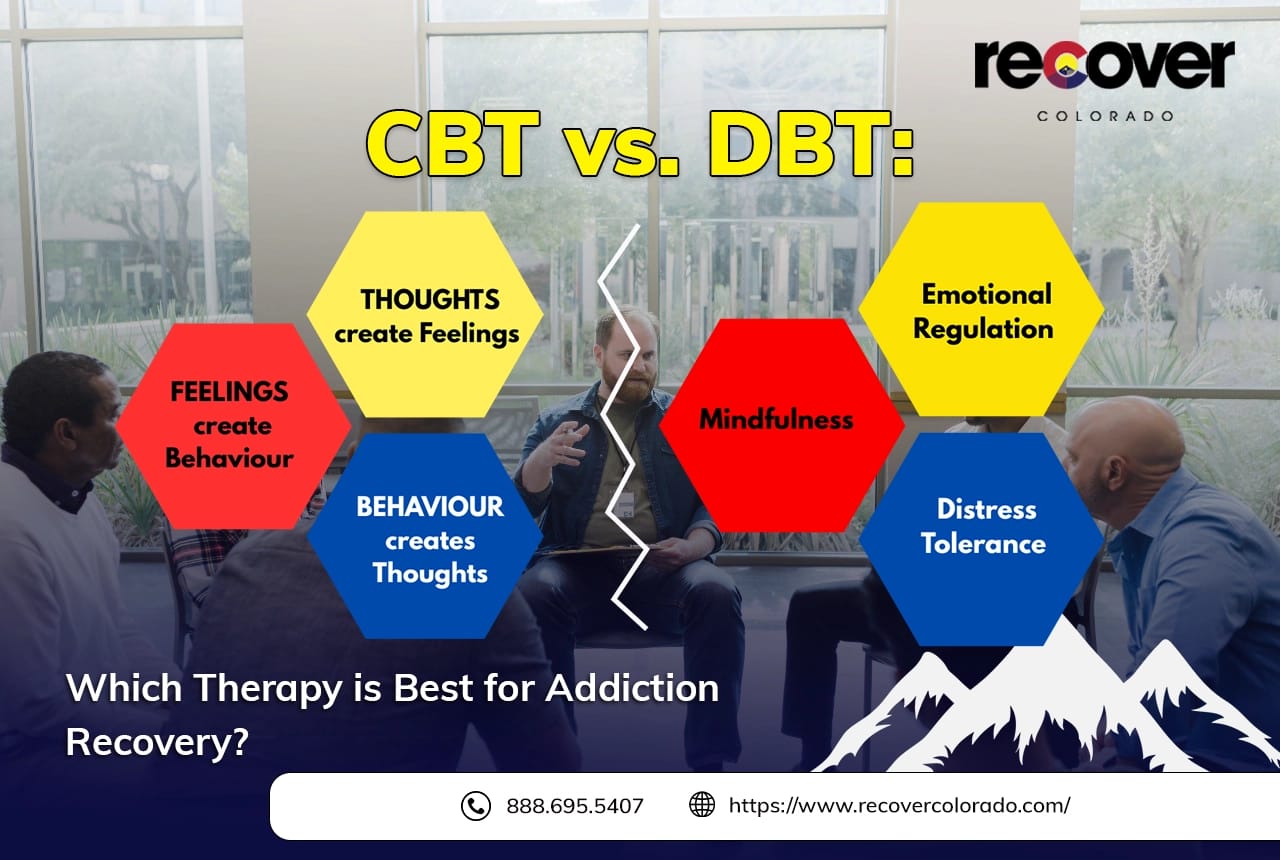Addiction recovery is a complex journey that requires the right therapeutic approach to help individuals overcome substance use disorders. Two of the most effective therapy methods used in addiction treatment are Cognitive Behavioral Therapy (CBT) and Dialectical Behavior Therapy (DBT). While both are evidence-based treatments, they have distinct approaches and benefits for individuals in recovery.
In this blog, we’ll explore the differences between CBT and DBT, their effectiveness in addiction treatment, and which therapy may be best suited for different individuals.
Understanding Cognitive Behavioral Therapy (CBT)
Cognitive Behavioral Therapy (CBT) is a widely used psychological treatment that focuses on identifying and changing negative thought patterns that influence behavior. It is based on the idea that our thoughts, feelings, and behaviors are interconnected.
How CBT Works in Addiction Recovery
CBT helps individuals recognize and challenge harmful thought patterns that contribute to addiction. Through structured sessions with a therapist, patients learn to:
✔️ Identify triggers that lead to substance use.
✔️ Develop healthier coping strategies.
✔️ Challenge and reframe negative thinking patterns.
✔️ Improve decision-making and problem-solving skills.
Key Techniques Used in CBT
-
Cognitive Restructuring – Helps individuals identify and replace irrational or harmful thoughts with realistic and positive alternatives.
-
Behavioral Activation – Encourages engagement in positive activities to replace substance use.
-
Skills Training – Teaches coping skills to handle cravings and avoid relapse.
-
Exposure Therapy – Helps individuals face and manage stressors without resorting to substance use.
Benefits of CBT for Addiction Treatment
🔹 Highly structured and goal-oriented.
🔹 Short-term and effective for addiction recovery.
🔹 Helps manage co-occurring mental health issues like anxiety and depression.
🔹 Teaches practical skills to prevent relapse.
CBT is ideal for individuals who struggle with self-destructive thoughts and behaviors, as it provides actionable strategies to break the cycle of addiction.
Understanding Dialectical Behavior Therapy (DBT)
Dialectical Behavior Therapy (DBT) is a specialized form of therapy developed from CBT but with an added focus on emotional regulation, mindfulness, and distress tolerance. Originally designed for individuals with borderline personality disorder, DBT has proven highly effective in addiction recovery.
How DBT Works in Addiction Recovery
DBT helps individuals manage intense emotions that often drive substance abuse. It incorporates acceptance-based strategies to help individuals regulate their emotions and behaviors without resorting to drugs or alcohol.
Key Techniques Used in DBT
-
Mindfulness – Encourages individuals to stay present in the moment and make conscious choices instead of acting impulsively.
-
Emotional Regulation – Teaches techniques to manage overwhelming emotions that lead to addiction.
-
Distress Tolerance – Helps individuals cope with stress and pain without turning to substances.
-
Interpersonal Effectiveness – Improves communication and relationships to build a strong support system.
Benefits of DBT for Addiction Treatment
🔹 Focuses on emotional healing and acceptance.
🔹 Helps individuals with intense mood swings and emotional instability.
🔹 Provides coping strategies for high-risk situations.
🔹 Encourages mindfulness and present-moment awareness.
DBT is particularly beneficial for individuals who experience strong emotional reactions and struggle with impulse control, as it teaches them how to tolerate distress without resorting to substance use.
CBT vs. DBT: Key Differences
| Aspect | CBT | DBT |
|---|---|---|
| Focus | Changing negative thought patterns | Emotional regulation and distress tolerance |
| Best for | Individuals with negative thinking habits | Individuals with intense emotions and impulsivity |
| Core Techniques | Cognitive restructuring, problem-solving | Mindfulness, emotional regulation, distress tolerance |
| Structure | Short-term, goal-oriented | Long-term, acceptance-based |
| Application in Addiction Recovery | Helps identify triggers and modify behaviors | Helps manage emotions that drive substance use |
Both CBT and DBT are effective in addiction treatment, but the choice depends on the individual’s personal needs, emotional state, and triggers.
Which Therapy is Best for You?
The best therapy for addiction recovery depends on:
✔️ Your emotional state – If you struggle with emotional regulation and impulsivity, DBT may be a better fit.
✔️ Your thinking patterns – If negative thought patterns fuel your addiction, CBT can help.
✔️ Your goals – If you need a structured, goal-oriented approach, CBT is ideal. If you need mindfulness and emotional support, DBT is better.
Many addiction treatment centers use a combination of CBT and DBT to provide a well-rounded recovery plan.
Both CBT and DBT are highly effective therapies for addiction recovery, each offering unique tools to help individuals break free from substance dependence. CBT focuses on changing negative thought patterns, while DBT emphasizes emotional regulation and mindfulness.
If you or a loved one is struggling with addiction, seeking professional therapy is a crucial step toward lasting recovery. Speak with a treatment specialist to determine whether CBT, DBT, or a combination of both is the best approach for your journey to sobriety.
For more information on addiction treatment, visit Recover Colorado or call 303.268.1340today!

